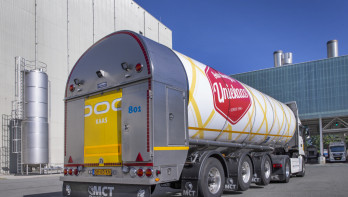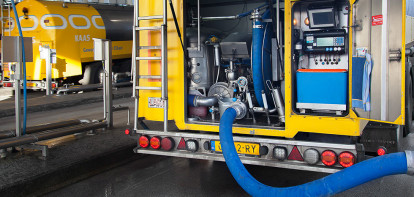Interview Mensink & Van 't Klooster
DOC Kaas attracts new members despite challenges
The introduction of the new milk stream with Jumbo and Uniekaas Holland has significantly attracted Dutch dairy farmers to join DOC Kaas, according to the chairman and vice-chairman of the cooperative. In an interview at the Zuivelpark in Hoogeveen, various topics were discussed, and Guus Mensink (right) and Gerbrand van 't Klooster were not afraid to take a stand on several issues.
The issues at DMK were also addressed, although they prefer the term 'necessary reorganization' instead. This reorganization is partly due to a decrease in milk production in Germany and partly because a group of German members issued 'a yellow card' by resigning their membership. The figures circulating in the media are likely somewhat exaggerated.
Guus Mensink & Gerbrand van 't Klooster
Guus Mensink is the chairman of the DOC Kaas cooperative and serves on the Supervisory Board of DMK. He runs two dairy farms in Dedemsvaart and De Krim with his brother. Gerbrand van 't Klooster (lef on picture) is a board member and vice-chairman of the DOC Kaas cooperative. He represents DOC Kaas in the General Assembly of Shareholders of DMK and the board of the DMK cooperative. He is a dairy farmer in Haule, Friesland, and also works as the director of the Federation of Private Landowners.
Champions League
Mensink has made many trips from his hometown Dedemsvaart to the Jumbo headquarters in Veghel over the past two years, but he did so with pleasure. The setup of the new milk stream "Tuurlijk!" was very important to him. With this initiative, DOC Kaas is now playing in the Champions League, comparable to top milk streams in the country. While DOC Kaas tends to be modest about such labels, they are certainly proud. Mensink believes that it was crucial to find the right partner, which they have found in Jumbo, the second-largest supermarket in the Netherlands with significant market share. This allows them to create volume, which was essential for this step. The introduction in April was just the first step, with the goal to grow further together in the coming years.
In principle, any member of the DOC Kaas cooperative can participate in the new milk stream, which offers a generous premium of 5 cents on top of the base milk price, excluding the grazing premium of 1.5 cents. There is no waiting list or anything similar. However, the requirements should not be underestimated, according to Van 't Klooster. He notes that the new milk stream is interesting for several reasons. Besides the extra milk money, it allows participating dairy farmers to achieve interest discounts at various banks or a leasehold discount at ASR without additional conditions. "It has great appeal to our own members, and we notice that it also attracts interest from potential new members of our cooperative," Mensink adds. "There will be a new entry point on July 1st. In April, some dairy farmers were not ready yet, but they can join then, or later this year or next year."
Close to the Market
The DOC Kaas milk price has drawn attention in recent years. In 2022, it soared above all others, but the decline in 2023 was significant. Mensink emphasizes that the milk pricing system is fundamentally sound, with attractive volume premiums that appeal to larger farmers. Additionally, there are sustainability and climate premiums. The vlog and grazing premiums are stackable, which is not always the case with other processors. The chairman also stresses that there is no redistribution of milk money, which he considers a nice cooperative principle. Equal prices for fat and protein are also attractive, especially for farms with Jersey cows. "You can more easily control fat content than protein."
Mensink explains the milk price decline in 2023, which members may not always like but often understand. "The milk price at DOC and DMK is closely tied to the market. You notice this in a rising market but also in a declining market. When the dairy market plummeted at the beginning of 2023, we could not maintain the high payout price. This was partly due to a significant devaluation of cheese inventories and an ongoing energy contract that led to high energy costs. We will not supplement from our own equity but aim to pay out pure milk money earned in the market." Van 't Klooster agrees that such accounting measures would be unwise as they would haunt the future. DMK's results for 2023 will be published in mid-June. Despite a challenging market, the results are positive, and there has been a slight improvement in equity.
Growth in the Netherlands, Decline at DMK
In a shrinking market, competition among milk processors in the Netherlands is fierce, Mensink and Van 't Klooster acknowledge. DOC Kaas is actively recruiting and claims to be successful. While they do not provide specific growth numbers, they mention that the cooperative welcomed several dozen new members in both 2022 and 2023. At DMK in Germany, it is a different story, with potentially 700 million kilos of member milk disappearing due to resigning dairy farmers dissatisfied with low milk prices in 2023. Mensink considers this a significant volume but does not refer to it as 'problems.' Instead, he talks about 'members who issued a yellow card.' He believes that the situation may not be as bad as it seems, as experience shows that not every resigning member leaves, and some cancellations are withdrawn. Van 't Klooster adds that this strategy was often used to keep DMK sharp. "As board members and supervisors, it is our duty to prioritize this."
Beyond departing members, milk supply volumes are under pressure in Germany as well. Mensink notes that many farmers are abandoning their dairy operations to focus solely on arable farming. This applies to former DDR farms in East Germany and also occurs in the Netherlands. "If you ask what I find less enjoyable about my board work, it's seeing beautiful farms closing their doors." As a consequence of the shrinkage in Germany, DMK is focusing more on value-added products and closing some factories to improve efficiency. DMK also moved to a new, smaller headquarters in Bremen with lower rent, Van 't Klooster adds. Despite the challenges, both leaders view DMK as a solid company with a strong balance sheet and brands, emphasizing the need to adapt in a dynamic market.
Almost ten years after the merger, there is little dissatisfaction about the collaboration with the Germans. On the question of whether DOC Kaas is now just a glorified supplier association, Van 't Klooster responds firmly: "Anyone who thinks that has got it wrong. DOC Kaas and DMK merged, but both cooperatives remained independent and jointly own the merged company." Mensink adds that DOC Kaas is autonomous, takes initiative, and inspires. The chain collaboration with Jumbo and Uniekaas Holland is an example of this and is new to German retail, generating significant interest. "Sometimes there are critical questions, but that keeps you sharp."
Ground-Based Dairy Farming Standard Not the Right Path
In a discussion with the cooperative's leaders, the topic of agricultural politics in the Netherlands cannot be ignored. The coalition agreement inspires confidence, but implementation remains to be seen. "The dossiers on manure and nitrogen are challenging and impactful. It is more important than ever for the sector to speak with one voice. The interests of dairy farmers and the dairy industry are closely aligned. You need to support each other," says Van 't Klooster. He believes that the NZO is increasingly representing the interests of the dairy sector well. "It is good that NZO is involved in finding solutions to societal issues affecting dairy farmers, such as the manure problem, but sometimes a bit more effort is needed. The dairy sector cannot do without dairy farming, and that must be fought for. There is a lot of pressure on farmers."
When asked if someone from DOC Kaas should join the NZO board, both men agree. "We think it would add value. There is a vacancy, so who knows."
Regarding advocacy, DOC Kaas wants to highlight a point. The political path towards ground-based dairy farming is not the way to achieve sustainability. "This approach will cost the sector a lot of money, raising costs without changing the amount of manure per hectare. The current manure legislation allows farmers to exchange manure between livestock and arable farmers effectively, with some manure going to processing. This system works well, so let's focus on further collaboration," Mensink concludes. He is hopeful about discussions in the new coalition regarding a balance sheet approach for accountable substances.


